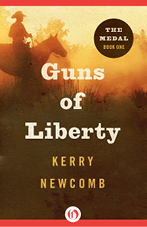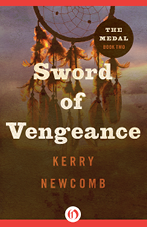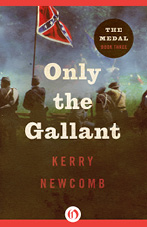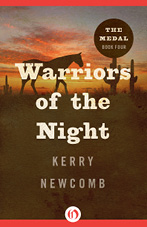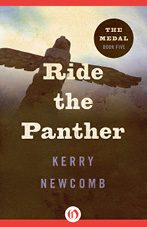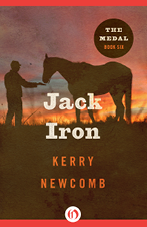Warriors of the Night (27 page)
Read Warriors of the Night Online
Authors: Kerry Newcomb

Jesse shrugged, and slung his own saddlebags over his shoulder and headed out onto River Street. No doubt the town marshal would help him locate Doc Curtis. Jesse wasn’t worried.
Peter Abbot was like a member of the family. He had served with Jesse’s father in the Mexican War and had become an unofficial uncle to the children of Ben McQueen. At the outbreak of war, it was to Peter Abbot that Jesse had come with a request to serve under the major’s command. Abbot had been only too happy to oblige. The major’s dispatches, however, were always cut and dried—“Report here” and “Go there” and “Wait until contacted.” Jesse never knew what to expect. However, one thing was certain: no matter where the major’s orders sent Jesse McQueen, the captain could always count on finding trouble at the end of the line.
The marshal of Kansas City was home tending his wife and helping as best he could in the birth of his second child, but his deputy, a laconic young man by the name of Hiram Hays, managed to bestir himself from the marshal’s chair long enough to refill a blue tin cup with coffee from the stove back near the jail cells at the rear of the building. Hiram took his time, enjoying his authority and posturing with all the gravity of a man wise beyond his years.
Jesse waited patiently, allowing the deputy his moment of glory. Come tomorrow with the marshal’s arrival, Hiram would return with broom in hand to a more humble status.
“Doc Curtis,” Hiram repeated. “Sure I know where he lives. Been patchin’ me up since I was sloppin’ hogs on my granpap’s farm. And who might you be?”
“Captain Jesse McQueen.”
“McQueen, huh?” Hiram scratched a yellow thumbnail along his stubbled jaw and appeared to recognize the name. “What with all you soldier boys in town, hell, I can’t tell y’all apart. Don’t get me wrong, me and most others are glad for the troops, what with them Confederate devils about.”
“I came in on the
Westward Belle
not an hour ago. But news about the Lawrence raid was all the talk in St. Louis.”
On the twenty-first, Confederate guerrillas led by the infamous William C. Quantrill, Bloody Bill Anderson, and the Choctaw Kid had looted and burned Lawrence, Kansas, only a long day’s ride from the Missouri border. Over a hundred and fifty citizens had been killed during the raid, most of them innocent townspeople, many of them young men approaching military age who had yet to don a blue uniform. The destruction of Lawrence by Confederate guerrillas was the brutal culmination of years of border warfare that had plagued Missouri, Kansas, and the Indian Territory for too long.
“Folks’ll be hearin’ about it long after we’re gone,” Hiram added. “Quantrill was there. And the Choctaw Kid. Bloody Bill himself hung the town marshal and his deputy from the mercantile sign.” Hiram stared dolefully at the coffee that somehow seemed as black as his prospects for the future. “He’d already hung ’em. Why do you suppose he shot ’em to doll rags? ’Cause that’s what he did afterwards. My cousin seen the whole thing while he hid under the walkway.” Hiram slapped the gun riding high on his hip and glared out the window at Main Street with its parade of townsfolk and soldiers as if they offered him a personal affront.
Jesse noticed he was losing the deputy once more to reverie and slid the blank side of a wanted poster in front of the man with the badge.
“Huh?” Hiram looked up.
“Doc Curtis. Maybe you could draw me a map?”
“Oh yeah. Surely. Now see here, all you do is follow Main Street plumb out to the edge of town and turn back toward the river.” Hiram took a pencil stub and drew a meandering line on the paper, then a fork in the road. A couple of squiggles indicated the river and a rectangle Doc Curtis’s house. “But like I said…the doc and his wife are over to the marshal’s helpin’ with that new baby.”
“Thanks,” Jesse replied. The way looked pretty cut and dried. He started to leave and had his hand on the door when the deputy spoke again.
“McQueen…You kin to a Ben McQueen?”
“Yes,” Jesse guardedly answered. “Why?”
“He’s dead.”
Hiram went on to describe the scene of the ambush, the gunfight at the warehouse, and how Ben apparently managed to shoot dead his two attackers before falling into the river, mortally wounded. McQueen’s body washed up on the riverbank, Hiram continued. Doc Curtis had confirmed the man’s demise. “I still got the newspaper, somewheres, that tells all about it. If you want to wait just a minute…” Hiram glanced up and saw the front door ajar. The noise of the street flooded in with the sunlight and the billowing dust. The deputy was alone in the office.
Forty minutes later, Jesse stood in front of a whitewashed frame house on the outskirts of town. Doc Curtis had built his house on a bluff overlooking the Missouri River where the breezes from the river blew cool and steady. A picket fence separated a dusty front lawn from the dusty road. A few wildflowers graced the front of the house and lined the few steps up to the porch and front door.
Jesse dismounted from a dun gelding he’d purchased in town. He tethered the animal to a hitching post near a weathered gate. A few chickens scratched in the dirt near the stone walk, but they beat a hasty retreat and vanished around the corner of the house as Jesse approached. He had found the doctor’s place with little trouble. Walking the streets of the town, Jesse had felt the tension in the air. Federal troops were everywhere, yet their presence did little to quell the anxiety of the local populace.
He did not know how long he stood by the gelding, his hands folded on the saddle, staring at the empty-looking house. His father was dead. The words could be understood easily enough. It was the trip from his mind to his heart that left him numb and weighed down the movements of his hands and feet as he crossed in front of the fence and followed a well-worn path around the house toward the bluffs overlooking the river.
The back of the house had a rectangular wing consisting of three rooms that the doctor kept for those patients requiring his personal supervision. Since both Curtis and his wife were delivering a baby, Jesse figured the hospital rooms were empty. A barn with a small corral attached lay just beyond the house. The grounds in back of the house were dotted with pin oaks, providing shade for a double-wide swing and a haven for a flock of blue jays who protested Jesse’s intrusion.
He made his way to the edge of the bluff. A step further and the land swept down to the banks of the Missouri, a hundred and sixty feet below. Sunlight glinted on the muddy surface and, as he watched, a stern-wheeler rounded the bend back toward town and with smoke trailing from its twin stacks churned past the bluffs on its way northwest to Nebraska Territory and the mountains beyond the plains.
Jesse wiped a forearm across his eyes and felt a lump rise in his throat. He coughed and tried to clear the tightness and failed. He found Abbot’s dispatch in his pocket, crumbled it up in anger, and tossed the paper over the edge of the bluff.
What had brought Ben McQueen to Kansas City? Jesse’s father had been in Washington trying to impress upon the military authorities that there were forces and influences loose in the Indian Territory that threatened to explode into a second western front if the war office wasn’t careful. Kansas City was a long way from Washington, D.C. Jesse closed his eyes and pictured his father as he had been, so strong and indomitable. The pain lessened, to be replaced by a smoldering anger toward Major Peter Abbot, who no doubt had a hand in bringing Ben McQueen out from the halls of Congress to be murdered on some seedy riverfront. The more Jesse thought on it, the angrier he became. He turned toward the house and for the first time noticed smoke trailing from the black iron chimney of the hospital wing of Curtis’s house. So the place wasn’t deserted after all. Jesse’s features flushed with barely controlled rage.
“Major Peter Abbot,” he muttered beneath his breath, and started toward the low-roofed patients’ quarters. The three rooms shared a long common porch in front. Unshuttered windows looked out on a vegetable garden where rows of corn, peas, butter beans, and squash ripened in the morning sun. But Jesse McQueen didn’t give a damn about the wholesome, tranquil setting Mrs. Curtis had labored so hard to create. There were three doors to choose from. Jesse picked the one on the end according to the placement of the smokestack. Also, this room’s windows were suspiciously shuttered, ensuring the privacy of the occupant within. Perhaps Abbot was fearful for his own safety. Well, if he wasn’t before, the major better be now, Jesse thought as he reached the porch and headed straight for the oaken door. He worked the iron latch and struck the door with his shoulder, sending the door swinging inward to crash against the wall with a loud bang like a gunshot. Jesse leaped inside and, sure enough, Major Peter Abbot, a white-haired man dressed in faded blue military coat and trousers, whirled around, his eyes wide with alarm behind the round wire rims of his spectacles.
“Abbot, you son of a—!” As Jesse burst into the room, Peter Abbot was so startled he dropped his coffee cup and kicked it beneath a dresser as he stepped backward and nearly tripped over a chair.
Jesse froze just inside the room as sunlight flooded in behind him to carve a corridor of amber brightness through the shadows and bathe in its golden glow not only Abbot but another man half reclined upon a brass-frame bed and holding a pair of Colt Dragoons, cocked. He’d come a split second from blowing Jesse’s head clean off.
Jesse gulped and stared a moment into those twin gun barrels before focusing on the face behind them. The man in bed slowly lowered his guns, then spoke the two most welcome words Jesse had heard all day.
“Howdy, son,” said Ben McQueen.
Kerry Newcomb was born in Milford, Connecticut, but had the good fortune to be raised in Texas. He has served in the Jesuit Volunteer Corps and taught at the St. Labre Mission School on the Northern Cheyenne Reservation in Montana, and holds a master’s of fine arts degree in theater from Trinity University. Newcomb has written plays, film scripts, commercials, and liturgical dramas, and is the author of over thirty novels. He lives with his family in Fort Worth, Texas.
All rights reserved, including without limitation the right to reproduce this ebook or any portion thereof in any form or by any means, whether electronic or mechanical, now known or hereinafter invented, without the express written permission of the publisher.
This is a work of fiction. Names, characters, places, events, and incidents either are the product of the author’s imagination or are used fictitiously. Any resemblance to actual persons, living or dead, businesses, companies, events, or locales is entirely coincidental.
Copyright © 1991 by Kerry Newcomb
Cover design by Connie Gabbert
978-1-4804-7882-4
This edition published in 2014 by Open Road Integrated Media, Inc.
345 Hudson Street
New York, NY 10014

